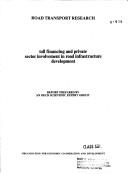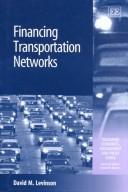| Listing 1 - 10 of 17 | << page >> |
Sort by
|
Book
ISBN: 8884530113 Year: 2001 Volume: 1 Publisher: Firenze : Firenze university press,
Abstract | Keywords | Export | Availability | Bookmark
 Loading...
Loading...Choose an application
- Reference Manager
- EndNote
- RefWorks (Direct export to RefWorks)
Toll roads --- Roads --- Roads, Toll --- Turnpike roads --- Tolls --- Electronic Road Pricing System --- Express highways
Book
ISBN: 8884530237 Year: 2001 Volume: 2 Publisher: Firenze : Firenze university press,
Abstract | Keywords | Export | Availability | Bookmark
 Loading...
Loading...Choose an application
- Reference Manager
- EndNote
- RefWorks (Direct export to RefWorks)
Toll roads --- Roads --- Roads, Toll --- Turnpike roads --- Tolls --- Electronic Road Pricing System --- Express highways
Book
ISBN: 9780833091345 0833091344 Year: 2015 Publisher: Santa Monica, Calif. RAND Corporation
Abstract | Keywords | Export | Availability | Bookmark
 Loading...
Loading...Choose an application
- Reference Manager
- EndNote
- RefWorks (Direct export to RefWorks)
Toll roads --- Tolls --- User charges --- Octroi --- Roads --- Roads, Toll --- Turnpike roads --- Electronic Road Pricing System --- Express highways

ISBN: 1280035080 9786610035083 9282112950 9282113744 Year: 2002 Publisher: Paris : OECD Publishing,
Abstract | Keywords | Export | Availability | Bookmark
 Loading...
Loading...Choose an application
- Reference Manager
- EndNote
- RefWorks (Direct export to RefWorks)
Strictly speaking, tolls are not a modern invention. Tolling is, in fact, an ancient tradition, with its origins rooted in history. Tolling has served numerous and wide-ranging purposes across the ages. While initially providing right of way, tolls were later used to finance the building and maintenance of infrastructure, before becoming a means of internalising external costs and managing demand. Nowadays, two main arguments are put forward for the introduction of tolls: to meet funding requirements and to respond to society’s desire for efficient use of infrastructure. However, as this Round Table shows, tolls are not a universal panacea and the introduction of road tolls is a politically delicate issue. The Round Table provides a broad view of both the theoretical aspects of tolling and the practical problems posed by its introduction. It takes a scientific look at what is a burning issue, at a time when a number of countries are envisaging the widespread adoption of electronic tolls.
ECMT. --- tolls. --- transport economics. --- Toll roads --- Roads --- Economic aspects --- Highways --- Roadways --- Thoroughfares --- Transportation --- Highway engineering --- Pavements --- Roads, Toll --- Turnpike roads --- Tolls --- Electronic Road Pricing System --- Express highways
Book
ISBN: 928211144X 9282104788 Year: 1989 Publisher: Paris OECD
Abstract | Keywords | Export | Availability | Bookmark
 Loading...
Loading...Choose an application
- Reference Manager
- EndNote
- RefWorks (Direct export to RefWorks)
Too much traffic? Road networks are increasingly unable to cope with ever-expanding requirements. Already severe in densely populated areas, the problem is becoming even more so as road traffic grows substantially. Since road congestion can jeopardise vital economic interests, some specialists are advocating a process of user selection, essentially by means of a price mechanism. This Round Table examines the introduction of "road pricing" or a similar method in the form of tolls and compares approaches adopted in a number of countries.
Transport --- Roads --- Toll roads --- Business & Economics --- Transportation Economics --- Roads, Toll --- Turnpike roads --- Tolls --- Electronic Road Pricing System --- Express highways --- Highways --- Roadways --- Thoroughfares --- Transportation --- Highway engineering --- Pavements --- Finance --- Congresses --- 711.7 --- 711.7 Planologie: verkeersnetten --- Planologie: verkeersnetten --- Finance&delete&

ISBN: 926412943X Year: 1987 Publisher: Paris OECD
Abstract | Keywords | Export | Availability | Bookmark
 Loading...
Loading...Choose an application
- Reference Manager
- EndNote
- RefWorks (Direct export to RefWorks)
Roads --- Toll roads --- 656.1 --- 711.7 --- Roads, Toll --- Turnpike roads --- Tolls --- Electronic Road Pricing System --- Express highways --- 711.7 Planologie: verkeersnetten --- Planologie: verkeersnetten --- 656.1 Road transport --- Road transport --- Highway finance --- Finance --- Road traffic

ISBN: 1840645946 Year: 2002 Publisher: Cheltenham Elgar
Abstract | Keywords | Export | Availability | Bookmark
 Loading...
Loading...Choose an application
- Reference Manager
- EndNote
- RefWorks (Direct export to RefWorks)
Roads --- Toll roads --- #SBIB:022.IO --- #SBIB:35H435 --- #SBIB:35H438 --- Roads, Toll --- Turnpike roads --- Highway finance --- Finance --- Beleidssectoren: economisch en werkgelegenheidsbeleid --- Beleidssectoren: openbare werken, verkeer en telecommunicatie --- Tolls --- Transport. Traffic --- Electronic Road Pricing System --- Express highways
Book
Year: 1999 Publisher: Washington, D.C., The World Bank,
Abstract | Keywords | Export | Availability | Bookmark
 Loading...
Loading...Choose an application
- Reference Manager
- EndNote
- RefWorks (Direct export to RefWorks)
December 1999 - The presence of preexisting tax distortions, and the form of revenue recycling, can crucially affect the size - and possibly even the sign - of the welfare effect of road pricing schemes. The efficiency gains from recycling congestion tax revenues in other tax reductions can amount to several times the Pigouvian welfare gains from congestion reduction. Parry and Bento explore the interactions between taxes on work-related traffic congestion and preexisting distortionary taxes in the labor market. A congestion tax raises the overall costs of commuting to work and discourages labor force participation at the margin when revenues are returned in lump-sum transfers. The resulting efficiency loss in the labor market can be larger than the Pigouvian efficiency gains from internalizing the congestion externality. By contrast, if congestion tax revenues are used to reduce labor taxes, the net impact on the labor supply is positive and the efficiency gain in the labor market can raise the overall welfare gains of the congestion tax by as much as 100 percent. Recycling congestion tax revenues in public transit subsidies produces a positive, but smaller, impact on the labor supply. In short, Parry and Bento's results indicate that the presence of preexisting tax distortions, and the form of revenue recycling, can crucially affect the size - and possibly even the sign - of the welfare effect of road pricing schemes. The efficiency gains from recycling congestion tax revenues in other tax reductions can amount to several times the Pigouvian welfare gains from congestion reduction. This paper - a product of Infrastructure and Environment, Development Research Group - is part of a larger effort in the group to study the cost-effectiveness of alternative transport policies. The study was funded by the Bank's Research Support Budget under the research project The Cost-Effectiveness of Alternative Transport Policies (RPO 683-39). Copies of this paper are available free. Please contact Roula Yazigi, email address ryazigi@worldbank.org. The authors may be contacted at parry@rff.org or abento@worldbank.org.
Congestion --- Congestion Reduction --- Costs --- Costs Of Travel --- Externalities --- Fuel --- Fuel Consumption --- Infrastructure --- Policies --- Public Trans Public Transit Subsidies --- Road --- Road Pricing --- Road Traffic --- Tax --- Taxes --- Traffic --- Traffic Congestion --- Transport --- Transport Economics, Policy and Planning --- Vehicle --- Vehicle Miles
Book
ISBN: 0125469500 Year: 1977 Publisher: London Academic press
Abstract | Keywords | Export | Availability | Bookmark
 Loading...
Loading...Choose an application
- Reference Manager
- EndNote
- RefWorks (Direct export to RefWorks)
Toll roads --- -Transportation --- -Public transportation --- Transport --- Transportation --- Transportation, Primitive --- Transportation companies --- Transportation industry --- Locomotion --- Commerce --- Communication and traffic --- Storage and moving trade --- Roads --- Roads, Toll --- Turnpike roads --- Tolls --- Electronic Road Pricing System --- Express highways --- History --- -History --- -Economic aspects --- Great Britain --- Economic conditions --- -Toll roads --- -Great Britain --- Public transportation --- Economic aspects
Book
ISBN: 1760462314 1760462306 Year: 2018 Publisher: ANU Press
Abstract | Keywords | Export | Availability | Bookmark
 Loading...
Loading...Choose an application
- Reference Manager
- EndNote
- RefWorks (Direct export to RefWorks)
Road pricing is not a new concept—toll roads have existed in Australia since Governor Macquarie established one from Sydney to Parramatta in 1811—and distance-based charging schemes have been trialled and implemented with varying success overseas. But how would full market reform of roads look in a federation like Australia? In its responses to the 2016 Australian Infrastructure Plan and the 2015 Competition Policy Review, the Australian Government explicitly supported investigating cost-reflective road pricing as a long-term reform option, and has committed to establishing a study chaired by an eminent Australian to look into the potential impacts of road pricing reform on road users. The challenges we face in this space are manifold and complex, and we still have a long road ahead of us. However, with advocacy for reform coming from interest groups as diverse as governments, private transport companies, peak industry bodies, policy think tanks and state motoring clubs, there is now more support than ever before for changing the way we provide for and fund our roads. This book seeks to advance the road reform agenda by presenting some of the latest thinking on road pricing and provision from a variety of disciplinary approaches—researchers, economists and public sector leaders. It stresses the need for reform to ensure Australians can enjoy the benefits of efficient and sustainable transport infrastructure as our population and major metropolitan cities continue to grow. Traffic congestion is avoidable, but we must act soon. The works presented here all point to the need for change—the expertise and the technology are available, and the various reform options have been mapped out in some detail. It is time for the policy debate to shift to how, rather than if, road reform should progress.
Transportation --- Roads --- Privatization --- Land use --- Planning. --- Finance. --- Government policy --- Land --- Land utilization --- Use of land --- Utilization of land --- Economics --- Land cover --- Landscape assessment --- NIMBY syndrome --- Denationalization --- Privatisation --- Contracting out --- Corporatization --- Government ownership --- Highway finance --- Transportation planning --- Toll roads --- taxation --- road pricing --- Australia --- Congestion pricing --- Fuel tax --- Infrastructure --- Singapore --- Transport
| Listing 1 - 10 of 17 | << page >> |
Sort by
|

 Search
Search Feedback
Feedback About UniCat
About UniCat  Help
Help News
News